NJW&C 10: Much Ado About ‘Nice Jewish Boys’

Hey, Kids! It’s Nice Jewish Words & Comics!, the latest installment from Neil Kleid's monthly newsletter with updates and info about his latest projects!
Welcome back, dedicated friends and readers.
We’re two weeks into March, and here on the East Coast we’re waiting for it to turn from lion to lamb—lost power the other day after heavy winds, and it’s been raining like crazy. But today…well, today was pretty nice and so I’m feeling pretty optimistic. Hopefully, dear pals, you are too.
As well you know, last week saw the release of Nice Jewish Boys #5, the last issue of the intimate, suburban crime comic book crafted by John Broglia, Ellie Wright, Sarah Litt and yours truly, released as a Comixology Original comic book on the Amazon Kindle app.

It’s weird that it’s finally and completely out. I’ve been thinking about this story in some shape and form (and in certain instances, living it) for years now. To have it out there for everyone to fully absorb and read...well, I hope it’s being enjoyed. We’ve received a lot of good feedback and buzz about the series, and I’ve done a fair amount of press for it. I’m hoping more readers pick it up when if finally comes out in print. For now, if you’re curious, you can buy all five issues on Amazon now (it’s free, I believe, if you’re an Amazon Prime subscriber), and then read the issues via the Amazon Kindle app (iOS | Google Play) on your device of preference, or at http://read.amazon.com/
Oh, yeah. And about that print edition…
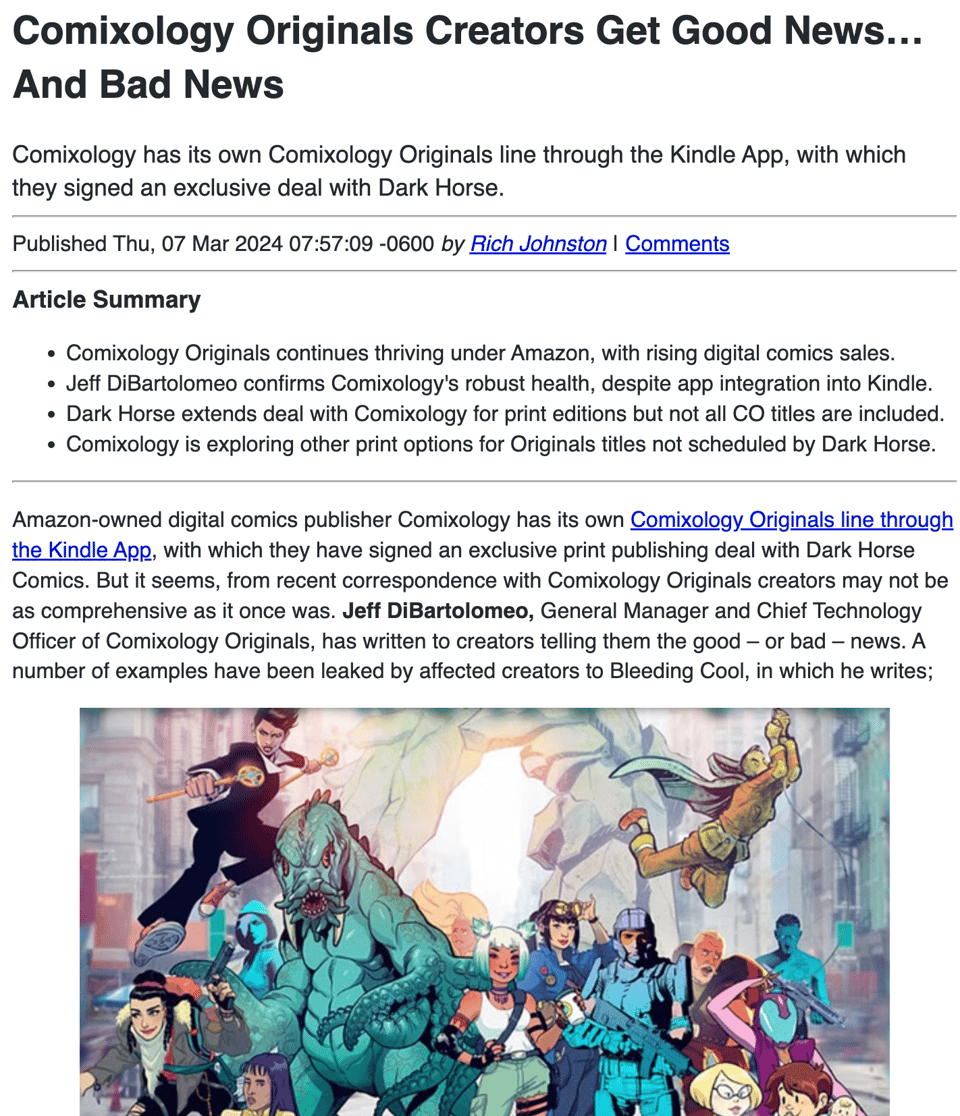
…so, some of you may have seen this article over here which stated that Dark Horse Comics, a fine purveyor of comics and graphic novels including Savor and some other cool stuff, has renewed their deal with Comixology by which they have agreed to print many of the Comixology Original series—as they did with The Panic, the NYC subway thriller by me and Andrea Mutti, which you can purchase right here. This time, however, they’ve decided as part of their new deal to be more selective about which Comixology Original titles they choose to print—because of the market, perhaps, or their release schedule—and sadly, one of the titles they have decided not to print is Nice Jewish Boys.
Why? Couldn’t say. I wasn't part of those conversations.
What I can say is this: Comixology is committed to getting our series into print somehow and some way. Several options are currently being explored, and when we have a clearer sense of the who, when and how of it all, you can be sure I’ll let interested folks know by screaming it from the virtual rooftops.
Disappointing? Of course. Hopeless? No way, pals.
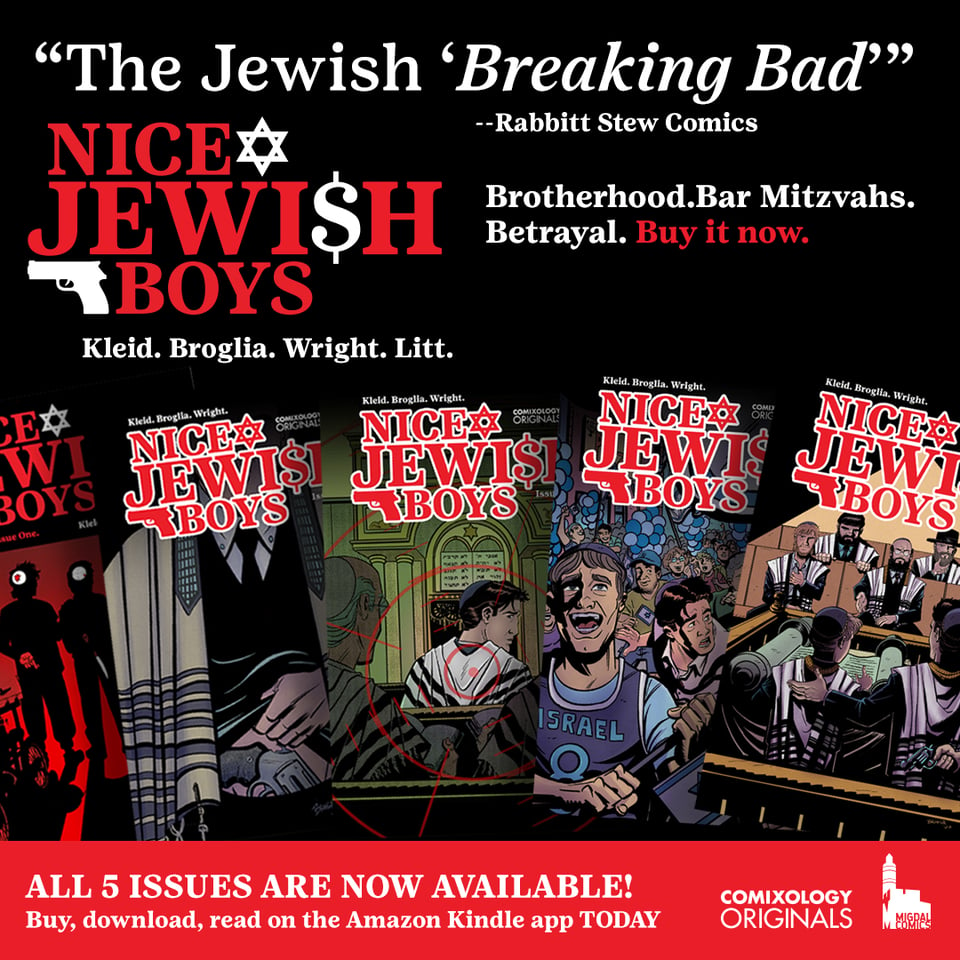
One day, one way, I promise that you’ll be able to hold a printed collection of Nice Jewish Boys in your hands. For now, unfortunately, the only way you can read the series is digitally—and if you haven’t gotten on board yet, the creative team appreciates you giving us a shot…and also telling others to do the same. If enough folks check out the comic book series digitally, that might help drive the demand for a print edition. Additionally, it doesn’t hurt to register your severe and crushing disappointment with the fine folks at both Dark Horse and Comixology, to show that there is a demand for the printed collection. Go shout at them on social media. Tell them that Chaim Davidovits and the Avodah sent you.
Remember? I’m optimistic today. It’ll happen. And once it does, you’ll hear about it here first, my fellow nice Jewish boy lovers. In the meantime...
VOTE FOR NICE JEWISH BOYS IN THE 2024 RINGO AWARDS!
Every year, comic book creators, creator-adjacents and fans of the medium come together to vote in The Mike Wieringo Comic Book Industry Awards, an annual celebration of the creativity, skill and fun of comics. The Ringo Awards are named for the late, great Mike Wieringo whose work I just...loved. Absolutely loved. Ringo is greatly missed by many in our industry, and I'm so thrilled there is an award out there with his name attached to help celebrate the medium of comic books.
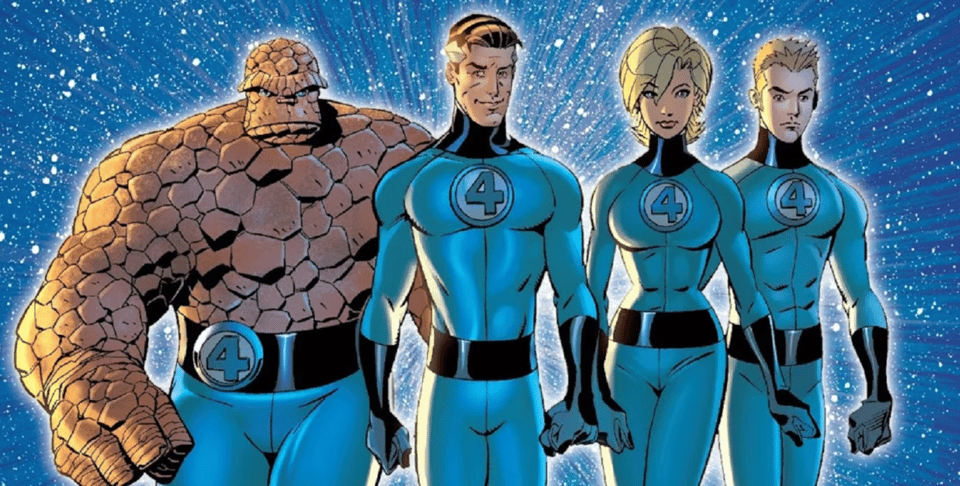
Of course, I'd also love if something that I wrote was at least nominated for a Ringo Award...and so, for this year's awards celebrating comic books which came out in the calendar year 2023, I'd appreciate if you'd throw some votes our way (Nice Jewish Boys #1 and #2 came out in 2023, so we're eligible!)
Vote at this link, (anyone can vote—you don't have to be part of the comic book industry or making comics) and below you can see some potential categories for which you might vote. Thanks again for your support!
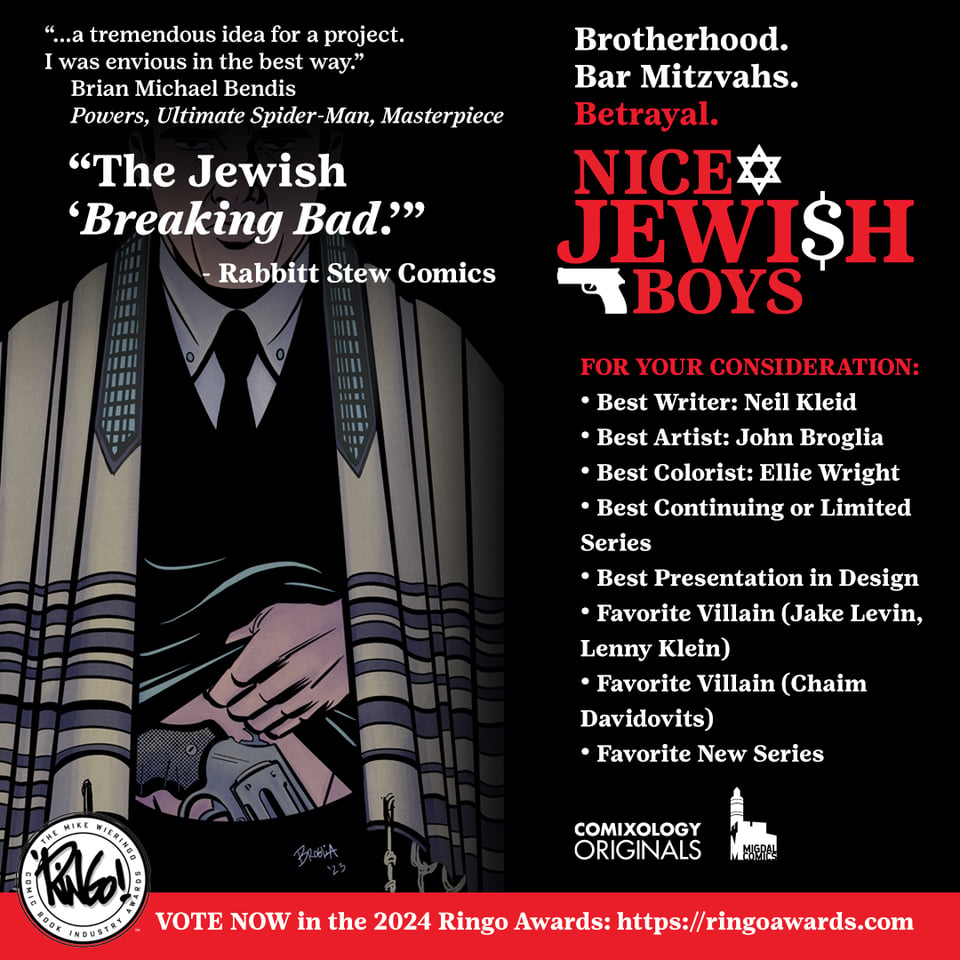
- Best Writer: Neil Kleid (that's me!) - Nice Jewish Boys
- Best Artist: John Broglia - Nice Jewish Boys
- Best Colorist: Ellie Wright - Nice Jewish Boys
- Best Continuing or Limited Series: Nice Jewish Boys
- Best Presentation in Design: Nice Jewish Boys
- Favorite Hero: Jake Levin, Lenny Klein - Nice Jewish Boys
- Favorite Villain: Chaim Davidovits - Nice Jewish Boys
- Favorite New Series: Nice Jewish Boys
NICE JEWISH NOTES
So, now that the series is out and finished, I find myself wondering what people think about Nice Jewish Boys. I’ll admit here: I’ve been a bit nervous.
This comic is been the second most personal story I’ve ever written (the first being “Crucify Me”, a comic I co-authored with Andy MacDonald for Z2 Comics’ Little Earthquakes, a story about my anxiety which was inspired by the song “Crucify” from Tori Amos). Sure, there’s a lot of me in every single story I write—from Ninety Candles to The Big Kahn; from my X-Men Unlimited short to Savor—but with Nice Jewish Boys, well…I mean, it’s really close to home.
Over the decades I’ve been writing comic books and graphic novels, I’ve often grappled with themes going on in my life and have attempted to wrestle those themes to the page, inserting them into the stories I’ve told. Most of my stories are about legacy in some way—children and parents, mentors and students, mantles of both religion and justice in whatever form they take. Many of my comics are about family, either that of blood or one formed by common bonds, classes or interests. And sure, I get preachy throughout most of them…but I’m usually pretty confident about the things I have to say. This one, though….this one was tricky. Mainly because I think when it comes to aspects of my community, my religion and my faith…well, those are things for which I’ve often had the most doubts about over the years.

The Big Kahn addressed some of that—at the time I was newly arrived in New York from the very religious, close-minded, right-leaning Orthodox Jewish community I grew up with in suburban Detroit. For the first time in my life, I was free to decide who I wanted to be, what I wanted to do, the level of my commitment to the religion I’d been following my entire life…now without rabbis or teachers or parents forcing me to follow a certain path. Before I left Detroit, my late mother begged me to “always remember who you are.” Two to three years later, I had no idea who that was—or who I was going to be. I went through a huge crisis of faith in terms of the restrictions I wanted to keep, the family I wanted to create, the things I needed to believe…and over time, I had to figure that out on my own. A lot of those decisions found their way into the pages of The Big Kahn—a story about a family of Jews struggling with their own commitments to faith after the death of their patriarch, a pulpit Rabbi, who is revealed to have been conning his community for forty years: he was never really Jewish. Some of the story, to be fair, is a bit unbelievable upon re-read…but a lot of it is gutting to me now, even years later having figured out the Jew I want to be.
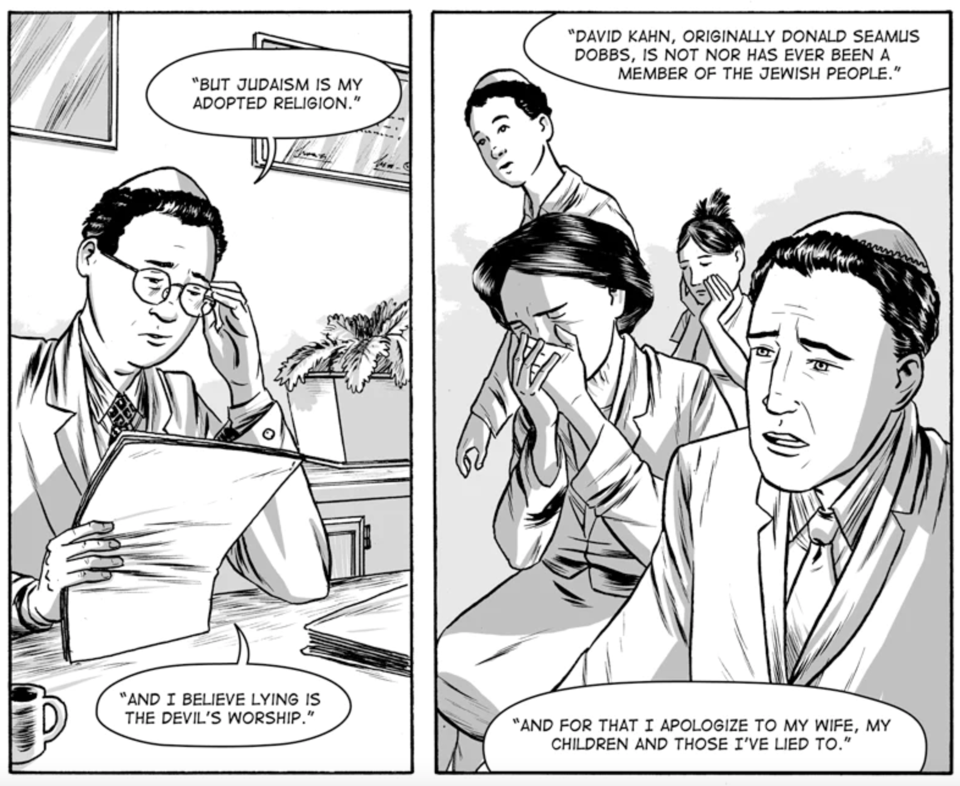
Other stories and comics have found my struggles infused inside the narrative, as well. With Savor, it was about figuring out what kind of heroes I wanted for my daughter. For The Panic, well, you can’t go a single page without finding politics laced into the panels. And for Nice Jewish Boys…a comic about a guy like me—writer, family man, father, citizen, friend and Jew—I found a canvas upon which to express many of my current anxieties as a member of a Modern Orthodox community, grappling with issues that many of us are grappling with, Jewish or not—finances, family, responsibility, loyalty, and the law—as well as quagmires specific to the members of my tribe—such as unwavering faith to a G-d, religion and community we love but all of which within there are flaws.
I asked myself lot of questions while making this comic (as I did John and Sarah, our tolerant editor who handles all of my freak-outs with grace and blunt aplomb). Was the story too niche? Would any one other than those living in my community actually even give a shit? Would other Jews be angry for me being as honest and vulnerable as I was being? Was I a “self-hating Jew”? Was this comic an excuse for anti-semites to misconstrue what I saw saying, and would they perhaps use it against my fellow Jews? Every single day, I waffled back and forth about what I should say in the pages—even knowing at heart what I really wanted to say. Ultimately, I’m incredibly proud of the final product. But even still…I wonder in the late watches of the night whether or not it’ll do more harm than good in the long run.

So, then why write this admittedly niche story? Like I’ve said, as someone born, raised, and living inside it, I’ve struggled with aspects of my religious Orthodox Jewish community for a while. Yes, the crime, sure. The true-life story upon which Nice Jewish Boys is based isn’t unique. It’s just one example of Jew-on-Jew crime, of which there are a growing and limitless number of examples. Jews, sad to say, have flourished, been stuck, found themselves exposed, or been indicted after unapologetically immersing themselves in the worlds of blue-collar, white-collar, and international crime. Like substance or sexual abuse, Jewish crime is one of those things we sometimes avoid discussing out loud, only gossiping about it at our Shabbos tables or behind closed doors, sometimes in a sad way, but also sometimes in a gleeful, lurid manner. And yes, Jewish crime provides the framework for this story’s narrative in a very public way; it’s a subject with which I’ve long been intrigued (as is evident to those who read Brownsville, my graphic novel with co-author Jake Allen, about Murder Incorporated).
But other aspects of my community have troubled me, too. Like the casual racism unconvincingly disguised as “retaliation to victimization,” usually employed by our older members but more often than not parroted by successive generations. In my own humble opinion, I might posit that some of it—along with casual homophobia—has resulted from a large majority of the modern and ultra-Orthodox Jewish community’s embrace of right-wing agendas. While seven in ten U.S. Jews identify with the Democratic Party, according to a 2021 study by the Pew Research Center, that same study revealed that 75% of Orthodox Jews surveyed were or leaned Republican. Many vocally agree with the GOP’s views on LGBTQIA+ rights, abortion, and plenty more. I’d like to think that’s the main cause, but to be fair, a lot of the derogatory terms, slang, and slurs hurled and spat without compunction (most, again, behind closed doors) in our community have been slipping off tongues for a long time.
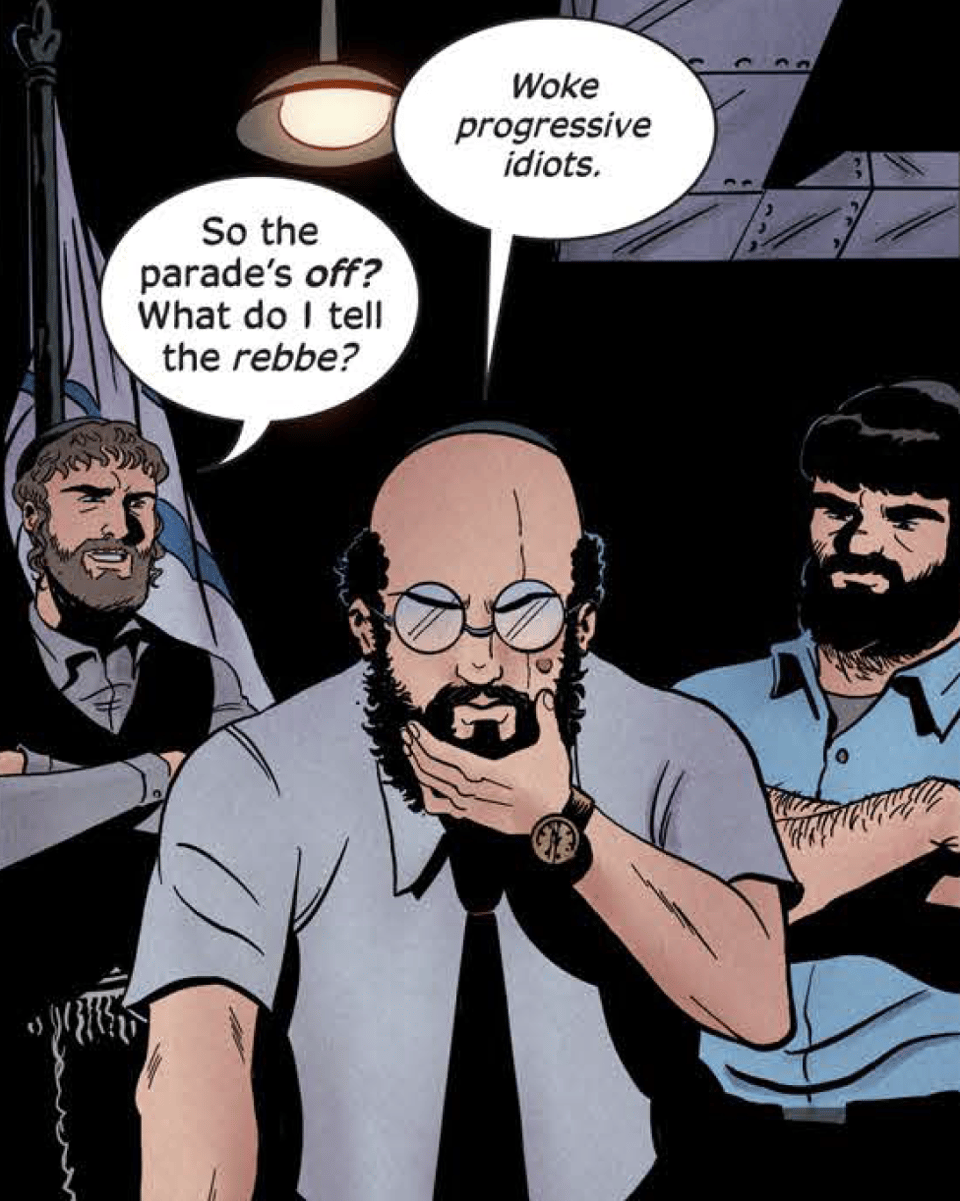
And, most important to NJB, there are financial hardships, real concerns to countless religious Orthodox Jews struggling to make ends meet, even though those issues might not be relatable to folks who think we bring our problems upon ourselves and don’t understand why we just don’t send our kids to public school (especially when the average U.S. family is having trouble affording the basics, like food, housing, and medical care, much less private school).
Some say conversations around modern Orthodox Shabbos tables gravitate toward three topics: food, Israel, or the cost of tuition in Jewish private schools. When I started writing this comic, I wasn’t just riffing off the stereotypes about Jews and money; I was reacting to conversations I’ve had with and about people in my community—even well-off families—scraping funds together for school, camp, synagogue dues, kosher food (especially around major holidays). and religious extras integral to our chosen lifestyle. Being an Orthodox Jew ain’t for the faint of heart; sure, the laws and regulations come with willing sacrifices, but it’s an exceedingly cost-prohibitive lifestyle. Yes, sending our kids to a Jewish private school with a dual-track curriculum (Hebrew and General Studies) is a choice, and that choice comes with costs that those outside our religion may not understand and, frankly, won’t be able to muster up sympathy (again, especially when they’re having trouble paying for essentials). Some Orthodox Jews choose not to make these choices, but most do. And just because choices like paying for kosher food or religious essentials are rooted in faith, that doesn’t mean they’re not fundamental to those who make it, and being unable to pay for something in which you truly believe can cause untold anxiety, no matter who you are.
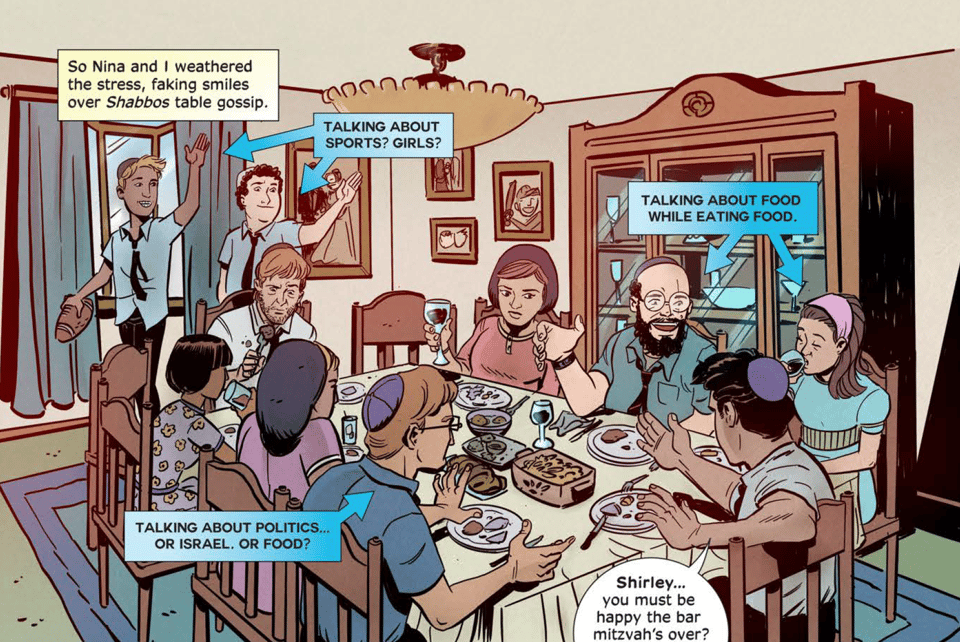
Which is a long way of me saying that I may have pissed off a lot of people by writing Nice Jewish Boys. So I’m gonna take them one at a time, starting with my family, friends, and community.
Look: Neil Kleid is not Jake Levin. His wife isn’t Nina Levin; his kids aren’t their kids, despite their names (Parker is actually the middle name of our oldest boy). My opinions are not always Jake’s, the ones you in this story. I didn’t grow up in Teaneck, but I have loved living here for fifteen years. Teaneck is a great place to raise a family and a wonderful place to live. The struggles I have with living as a religious Jew are not struggles unique to yids in New Jersey; they exist in Detroit, Chicago, L.A., Cleveland, Boston, Jerusalem, everywhere. Nor are those struggles unique to Orthodox Jews—there are all kinds of folks, from all kinds of backgrounds, having trouble making ends meet. What might be manageable to me may destroy someone else. Sure, I’m a writer too, and I’ve had to fund bar mitzvahs and make ends meet, but I’ve also got a full time day job and don’t rely on my writing alone to pay our family’s bills. Also, please don’t mistake my use of Teaneck for this story’s setting as the town’s condemnation. Again, it’s a lovely place to live, and the people who reside here are wonderful folks (at least the ones I know and dig). Again, this is a work of fiction; it’s a story that has lived inside my head and now graces the page thanks to my talented co-authors (we’ll get to them, too), and both pastiche and exaggeration dwell within. I chose to set it in my hometown, because I thought it would be fun. But it could have easily been set anywhere else, where Jews or otherwise struggle with difficult moral, ethical and financial decisions. Don’t fault my neighbors and friends for my ability to spin a compelling yarn; and definitely don’t blame my wife or kids for the choices I’ve made within my sequential narrative.
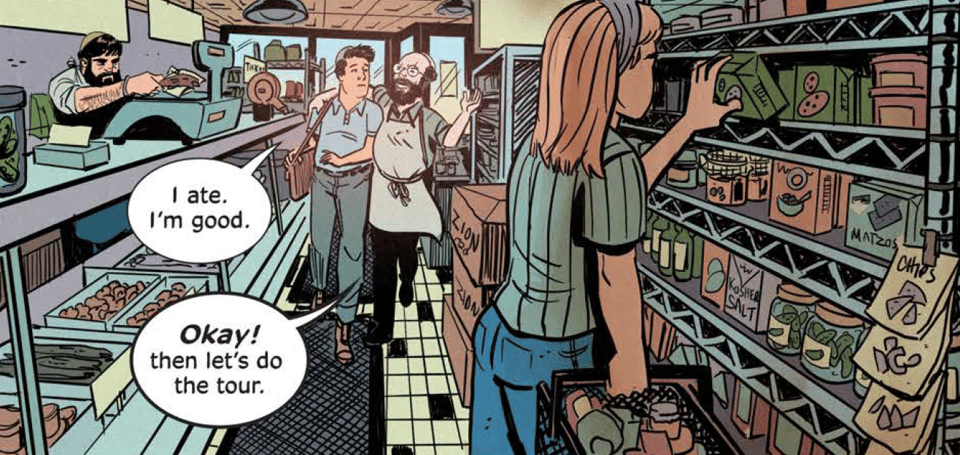
Additionally, while Chaim’s shop, “Te’Avon”, is based on an actual appetizing store in Teaneck, I want to make perfectly clear that its real-world doppelgänger is by no means housing a thriving criminal enterprise. Truthfully, Te’Avon was influenced by two different stores: Tibor’s in Cleveland, the subject of the true-crime story that inspired Nice Jewish Boys (for more about that, check out the back matter in issue 3), and the aforementioned store in Teaneck, owned by a good friend (which has both a fish and deli counter, by the way). Before my co-authors and I embarked on this adventure, I explained to that friend what I was trying to do, acquiring his blessing and permission to take photo reference for the version you see on the page. The idea was to have a location like Satriale’s in The Sopranos, where Chaim’s Avodah came to do business and enjoy a snack. I thought it would be best to add a little form to the fiction, and I want to thank my buddy and everyone else whose business, home, or synagogue you might find in the comic for allowing us to root our tale in a little reality. Again, this is a work of fiction, and the places and faces are mostly made up. I’m keeping the name of the real store out of this because I don’t want to cast a pall on my friend’s business, its staff, clients, or food, as did the true-life crimes on Tibor’s in Cleveland. Please patronize my friend’s store if you’re local and know where it is. The meat knishes and buffalo wings are equally fantastic.
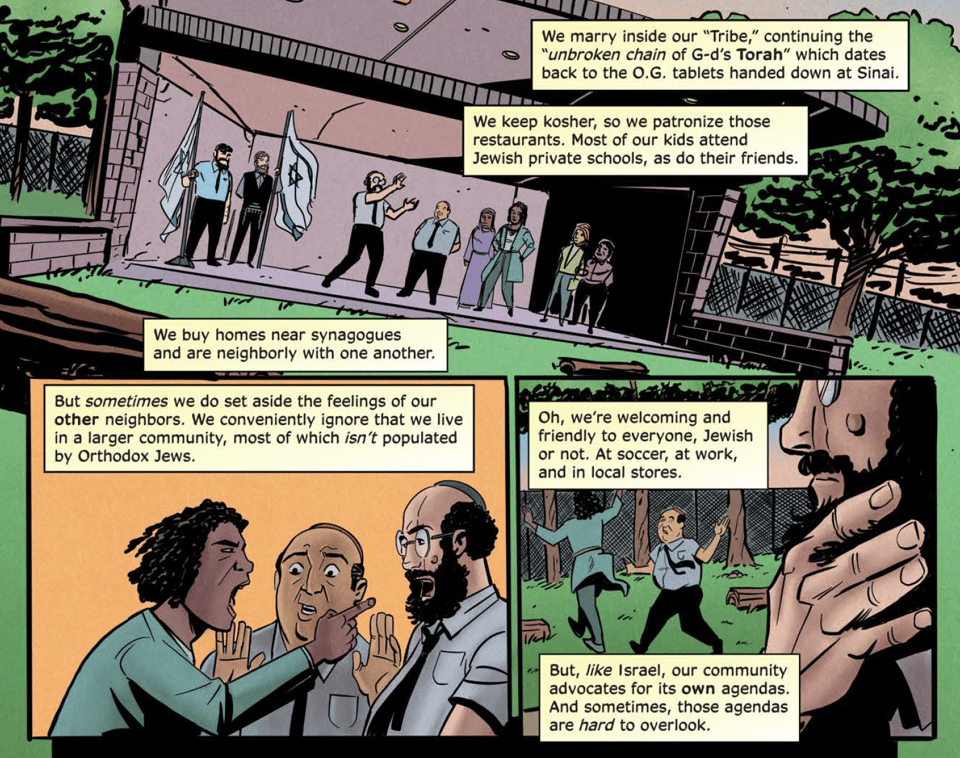
Did I make Jews look bad in this comic? I’ll likely get shit for saying that religious Orthodox Jews are insular and don’t connect with our non-Jewish neighbors, co-workers, or local community. Look, that’s a broad generalization, and I know plenty of religious Jews who serve on city or community councils, have deep and meaningful relationships and friendships with non-Jewish co-workers, colleagues, and neighbors, and are active in local or regional sports leagues, book clubs, gyms, and all different types of extracurricular activities.
But yeah, more often than not, we like to stick to our own. That’s just the truth. And we stand up for what we believe in, as do other minorities, as we all should because no one else will (usually) stand for us. But like other minorities (and, well, the majority), you can’t just discount or wish away our flaws. Despite following and living our lives to the letter of G-d’s Law, not everything we do is what He would have us do (hell, that’s why we have Yom Kippur, a Day of Atonement, right?). Those grey areas are what this book explores and exposes in service of Jake’s character arc, even if those truths are hard to swallow. Ultimately, exposing some of the ugly truths led Jake to realize that only sincere teshuvah could save his soul, along with a willingness to accept responsibility for what he did—and put the law before loyalty—even if it meant losing his family and freedom. I hope anyone reading can understand that, regardless of which race, religion, or creed they claim. I’ve said this again and again: I’m absolutely proud to be a G-d-fearing religious Jew who is raising his children to be the same…as well as (hopefully) being kind, generous, accepting, tolerant, inclusive, polite, curious, honest, and responsible. Sometimes being a “good Jew” means pointing out where we’re fucking up as a people (again, see: Yom Kippur), even for something we (and I) love and feel passionate about.
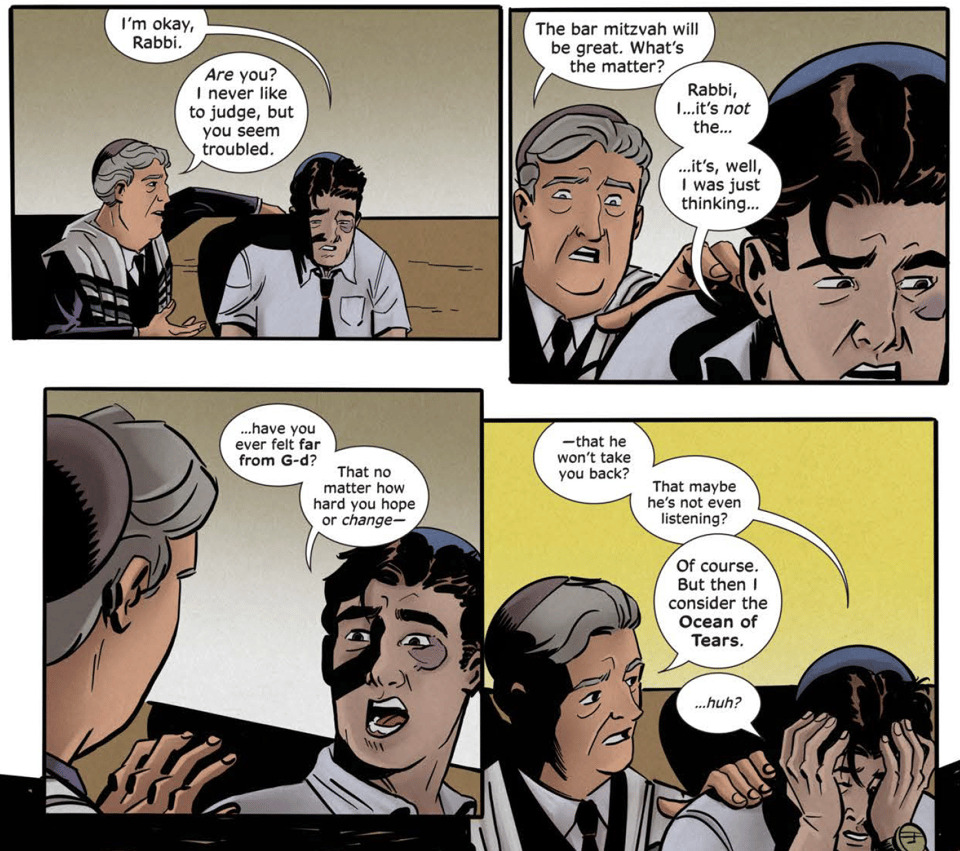
Anyway, there it is. Some folks are gonna hate me for this comic.
Definitely don’t hate my talented, amazing co-authors, though. John Broglia, who was courageous enough to jump aboard and figure this out after our previous foray on a very fictional little island filled with food pirates and hippo chefs, is not to blame for the words on the page or the shape of the narrative. What he is to blame for, however, are the beautiful, evocative depictions of my town, its inhabitants, the drama playing out within and without the Levin home, Jake’s emotional whirlwind, and the sordid goings-on at Te’avon. John’s stark, black-and-white depictions of the all-too-real landmarks and locations throughout Teaneck and the grace he brings to the pages are—as always—done with a brilliant level of care. John’s line art is enhanced and embellished by the wonderful Ellie Wright, whose deft palette heightens each scene, drowning our grief in darkness or brightening hopeful moments in vivid color. Massive thanks again to our fantastic editor Sarah Litt, whose sharp eye for detail and knack for helping wrangle plot holes, improve narrative, and tighten grammar—not to mention her brilliant editorial vision—ensured our train ran on time and never veered from the always precarious tracks. Our collective appreciation goes out to our families for strength, our friends for encouragement, everyone at Comixology past and present (shout outs to Chip Mosher and Bryce Gold, specifically) for their unyielding guidance and backing, and our colleagues for helping us get out the word and reading early drafts. And, of course, thanks to you for supporting our work and ensuring it had someone to read and appreciate it, no matter how you felt about it. We couldn’t do this without you. Thank you for continuing to support quality creator-owned comic books.
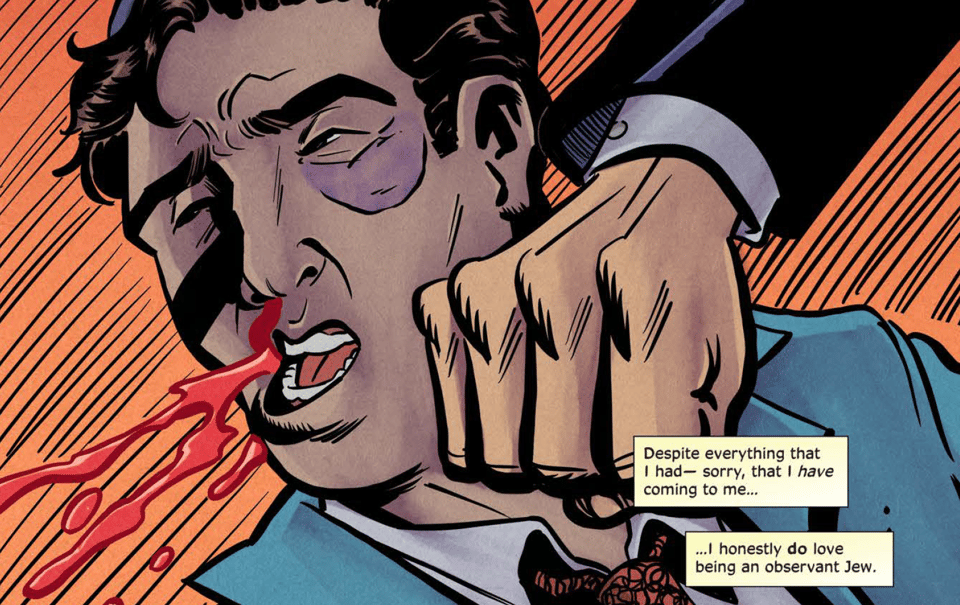
As I said at the end of issue #1, I am proud to be Jewish. I’m a firm believer in the need for more original Jewish fiction, whether in comics, prose, television, or film. Not all Jewish fiction is going to be pretty. Some of it, in fact, needs to be honest, ugly, messy, and divisive. It has to spark a reaction and conversation, opening the doors to debate, compromise, or change. My fellow co-authors and I hope, if nothing else, that’s what readers took away when reading Nice Jewish Boys. And we hope you do the same with any comic you may happen to read—Jewish or otherwise—even if, like others I’ve mentioned above, you might have come away from this one troubled and hating my guts.
But like the concept of teshuvah, here’s the great thing about writing any kind of story: I’ll always have the chance to write another one and win you back.
NEIL’S NEW KICKSTARTER ALERT: MULTIVERSE OF MYSTERY
Speaking of which, I’ve got some news for you, holmes…
…I’M WRITING SHERLOCK HOLMES (and WATSON)*
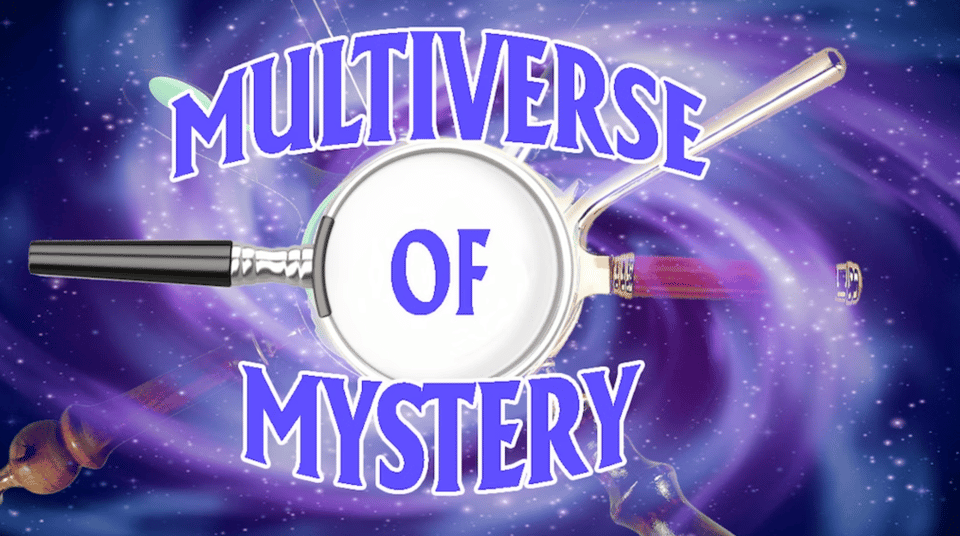
That's right, a brand-new prose anthology is LIVE on Kickstarter right now—Multiverse of Mystery, from the International Association of Media Tie-In Writers (IAMTW), offers, well... a multiverse of stories featuring Sherlock Holmes as you've never seen him before.
Some of you might remember that I was nominated for a 2022 Scribe Award by the IAMTW for “Kid Omega Faces the Music”, my short X-Men / Quentin Quire story in the School of X prose anthology from Aconyte Books and Marvel. Now, I’ve been invited to contribute a Holmes and Watson story to their new prose anthology by editors Carrie Harris, Bob Greenberger and David A Mcintee. Carrie and I both wrote stories in Aconyte’s School of X anthology (hers was a banger!) and though he might not remember, Bob Greenberger was one of the first-ever DC Comics editors I met way back when I visited the old offices at 1600 Broadway in 1999.
The Multiverse of Mystery campaign (“Project Baker” on Neil’s 2024 Writing Plan) features new takes on the great detective by a bunch of really cool tie-in authors including yours truly. I had never really considered penning a story about Holmes before—though my old good friend Tony Lee has written several—but once Carrie sent me an invite, a number of great ideas bubbled to the surface, and we landed on one I’m going to keep secret for now…let’s just say, it should be a lot of fun but first we need to fund the campaign. We’re over the 25% mark with less than 15 days to go, so any pledge or support would be appreciated! Check out the campaign page, the author list and rewards.
*I mean, I won't be writing Holmes if this book doesn't fund, right?
The game is afoot, my friends. Join the #multiverseofmystery!
IS THAT IT, NEIL?
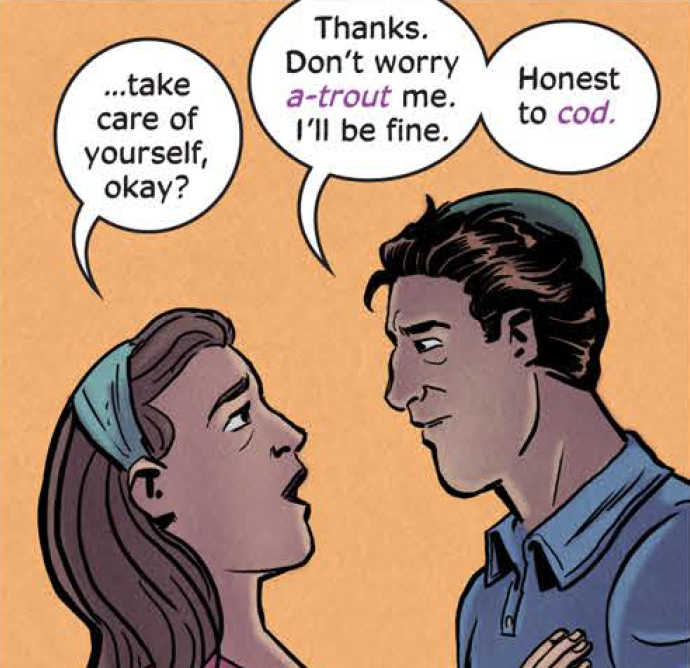
This was a bit of a long one, so I’ll end it here. Next time, we return to tracking Neil’s 2024 Writing Plan, and tease a few ideas coming together this year. We’ll also maybe talk about vampires. Or selling comics to Hollywood. Or both.
Go read Nice Jewish Boys. All of it. Tell your friends, and tell the Powers That Be that it deserves a print edition.
Seeya in two weeks, Hebros, Hebrettes, and fellow comics enjoyers.
—Neil